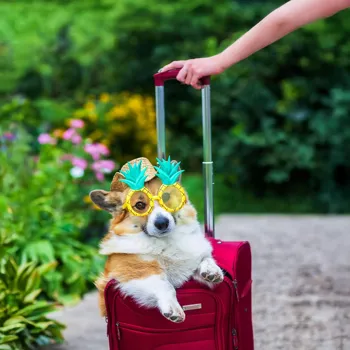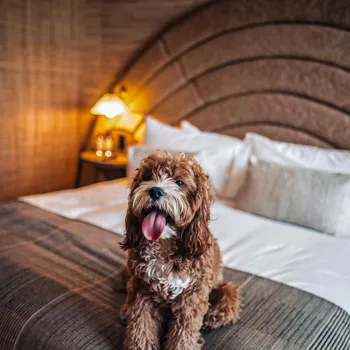Embark on adventures with your pet stress-free! Learn essential tips for smooth pet travel now!
Planning a trip? Want to bring your furry (or scaled, or feathered!) friend along? Traveling with pets can
be a truly rewarding experience, creating unforgettable memories.
However, it also requires careful planning and consideration to ensure a safe and comfortable journey for both you and your beloved companion. Gone are the days of leaving your pet behind with a heavy heart. Now, many Indians are opting to include their animals in their travel adventures.
From quick weekend getaways to longer holidays, making it work involves a bit of preparation. Here are seven essential tips to help you navigate the world of pet travel with confidence and create a positive experience for everyone involved:
Visit vet before travel to ensure pet's health, vaccinations, and comfort
Before you even start packing your bags, the most crucial step is a visit to your veterinarian. This isn't just a formality; it's about ensuring your pet is fit for travel and won't be at risk during the journey.

Discuss your travel plans with your vet, including the destination, mode of transportation, and duration of the trip. Your vet can conduct a thorough check-up to identify any pre-existing conditions that might be aggravated by travel.
They can also administer any necessary vaccinations or booster shots, ensuring your pet is protected against common diseases in the destination area. Remember to obtain a health certificate from the vet, as this is often required by airlines, trains, and some hotels.
Think of it as your pet's "travel passport," verifying their good health and compliance with vaccination requirements. This certificate is vital and could prevent problems during check-in or border crossings. Ask your vet about motion sickness medication if your pet is prone to car sickness.
This can make a big difference in their comfort level, turning a potentially stressful ride into a peaceful one. Finally, ensure your pet is microchipped, and that your contact information is up-to-date on the microchip registry.
This is your best bet for reuniting with your pet if they get lost during your travels.
Thoroughly research pet-friendly accommodations before booking
Not all hotels and accommodations welcome pets with open arms. Before booking, it's vital to thoroughly research and confirm that your chosen accommodation is pet-friendly and suits your pet's needs. Don't just rely on a generic "pets allowed" statement; dig deeper!

Enquire about any size or breed restrictions, additional pet fees, and specific rules regarding pet behavior within the property. Some hotels may have designated pet-walking areas, provide pet beds and bowls, or even offer pet-sitting services.
Consider your pet’s temperament and personality when selecting a place to stay. Will they be comfortable in a busy hotel environment, or would a quieter, more secluded cottage be a better fit? Look for accommodations with easy access to outdoor spaces for walks and playtime.
Reading reviews from other pet owners who have stayed at the property can offer valuable insights into their experience. Pack familiar items like your pet's favorite blanket, toys, and bed to create a sense of normalcy and comfort in the new environment.
This can help reduce anxiety and make them feel more at ease in unfamiliar surroundings.
Pack a complete pet travel kit for a happy, healthy journey
Just like you pack your suitcase, your pet needs their own travel kit stocked with essentials to keep them happy, healthy, and comfortable on the road.
This kit should include food and water bowls, a sufficient supply of their regular food (switching food during travel can upset their stomach), bottled water, poop bags (or litter box and litter for cats), a leash and harness, any necessary medications, a first-aid kit, and grooming supplies like a brush and shampoo.
Don't forget to pack their favorite toys and treats to keep them entertained and provide positive reinforcement during the journey. Consider including a travel-sized version of their familiar bedding or blanket to provide a sense of security and comfort in unfamiliar settings.
It's also a good idea to pack some cleaning supplies, such as paper towels and a pet-safe cleaner, in case of any accidents. Label everything clearly with your contact information, including your phone number and destination address.
Keep this kit easily accessible during travel, whether you're on a road trip or flying, so you can quickly address any of your pet's needs. A well-stocked pet travel kit is your insurance policy for a smooth and stress-free journey.
Acclimatize pets to travel gradually for positive experiences
If your pet isn't used to traveling, it's essential to gradually acclimatize them to the experience before embarking on a long journey. Start with short car rides, gradually increasing the duration over time. Make these outings positive experiences by rewarding your pet with treats and praise.
If you're planning to fly, familiarize your pet with their travel carrier. Leave it out in your home for them to explore and make it a comfortable space by placing their favorite blanket or toys inside. Encourage them to enter the carrier voluntarily by offering treats or toys inside.
Practice closing the carrier door for short periods, gradually increasing the duration as your pet becomes more comfortable. If your pet is anxious about car rides, try using a calming pheromone spray or diffuser in the car.
You can also play soothing music or provide them with a chew toy to help them relax. The goal is to associate travel with positive experiences and reduce any anxiety or fear they may have. Patience and consistency are key to successfully acclimatizing your pet to travel.
Plan regular pit stops for pet comfort during journeys
Long journeys can be tiring for both you and your pet. Plan regular pit stops along the way to allow your pet to stretch their legs, relieve themselves, and get some fresh air. This is especially crucial during road trips.
Stop at pet-friendly rest areas or parks where your pet can safely explore and exercise. Always keep your pet on a leash during these stops to prevent them from running off or getting into trouble. Offer them water and a small snack to keep them hydrated and energized.
Avoid leaving your pet unattended in the car, especially during hot weather, as it can quickly become dangerously hot inside. If you're traveling by train or bus, check the pet policy regarding stops. Some companies may allow short breaks at designated stations, while others may not.
Planning these breaks in advance ensures your pet remains comfortable and prevents them from becoming restless or anxious during the journey. Think of these pit stops as a chance to recharge and refresh both you and your furry companion.
Ensure pet safety when traveling by car, plane, or train
Whether you're traveling by car, train, or plane, ensuring your pet's safety is paramount. In a car, use a pet carrier or a pet seat belt to prevent them from moving around freely and potentially distracting the driver.
Never allow your pet to ride in the front seat or stick their head out of the window, as this can be dangerous. When flying, ensure your pet's carrier meets the airline's size and ventilation requirements. Label the carrier clearly with your contact information and destination address.
Inform airline staff that you're traveling with a pet and inquire about their pet handling procedures. If traveling by train, follow the railway's pet policy regarding carrier requirements and designated pet areas.
Keep your pet on a leash at all times when outside of their carrier or designated area. Be aware of potential hazards, such as busy streets, other animals, and unfamiliar surroundings.
By taking these precautions, you can significantly reduce the risk of accidents or injuries and ensure your pet's safety throughout the journey. A little bit of planning goes a long way in protecting your beloved companion.
Even with the best planning, unexpected situations can arise during travel. Pack a copy of your pet's medical records and health certificate in case of emergencies. Have the contact information for local veterinarians or animal hospitals readily available. Consider purchasing pet travel insurance to cover any unexpected medical expenses or lost pet situations. Be prepared for delays or cancellations, and have a backup plan in place in case your travel plans are disrupted. Stay calm and flexible, and remember that your pet is relying on you for guidance and reassurance. By being prepared for the unexpected, you can handle any challenges that may arise and ensure your pet's well-being throughout the journey. A positive attitude and a proactive approach can make all the difference in navigating the ups and downs of pet travel.
Traveling with your pet can be an incredibly rewarding experience, strengthening your bond and creating lasting memories. By following these tips and taking the time to prepare, you can ensure a smooth, safe, and enjoyable journey for both you and your furry, scaled, or feathered friend.
So pack your bags, grab your pet's leash, and get ready for an adventure! Remember, a happy pet makes for a happy trip!
AI Generated Content. Glance/InMobi shall have no liability for the content











